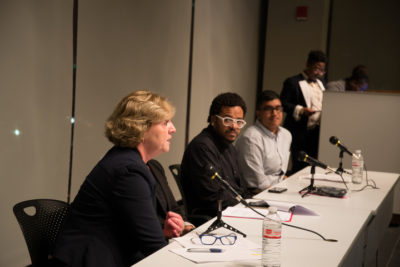PHOTO BY CHLOE GRINBERG/ BOSTON UNIVERSITY DAILY FREE PRESS STAFF
On Monday, October 23, 2017, in commemoration of Domestic Violence Awareness Month, the Violence Recovery Program at Fenway Health and Bianca Phoenix hosted a panel titled “Culturally Competent Care for LGBTQ survivors.” The event featured panelists from local organizations that support survivors of domestic violence and sexual assault: Fari Sattar, Outreach Worker & Advocate, The Violence Recovery Program (VRP); Tre’Andre Valentine, Director of Education, The Network/La Red (TNLR); Cassie Luna, School and Campus Outreach Coordinator, Boston Area Rape Crisis Center (BARCC); and Joan Meunier-Sham, Director, Massachusetts Sexual Assault Nurse Examiners (SANE) Program.
The moderators, Tanekwah Hinds and Bianca Phoenix, compiled the list of resources detailed by the panelists for providers and LGBTQ survivors to access in a Google Document. At the beginning of the event, Bianca Phoenix, community advocate and event co-organizer, detailed how partner abuse affects the LGBTQ community. According to the National Coalition of Anti-Violence Programs (NCAVP), transgender folks are nearly twice as likely as nontrans people to experience intimate partner violence in public. LGBTQ survivors with disabilities were two times more likely to be isolated by their abusive partner and four times more likely to experience financial violence when compared to LGBTQ survivors without disabilities. Undocumented LGBTQ survivors face unique challenges and fears within intimate partner violence, including fearing deportation if they interact with the criminal legal system or other state systems when accessing services. Bisexual folks face a higher rate of intimate partner violence than their lesbian, gay, and heterosexual counterparts.
Tanekwah Hinds, the Women’s Health Program Coordinator at Fenway Health, defined the importance of cultural competency for this community. She stated that “Cultural competency is not about being perfect in your knowledge about every marginalized community. It’s about being humble and willing to learn.” Tanekwah advocated for providers to develop an understanding of the disparities that their client faces and simultaneously accepting the diverse experiences of each and every one of their patients, as the LGBTQ community is not a monolith.
About 90 people attended the event, where the panelists answered questions on culturally competent care for LGBTQ survivors. The panelists discussed their organizations’ practices that reflect cultural competency for individuals of diverse gender identities and sexual orientations. In terms of intake forms, Cassie from BARCC stressed the importance of empowering the client to self-identify by choosing their own name and pronouns as well as forms accessible in different languages. Tre’ Andre Valentine discussed the necessity to reflect the community in the staff and work from an anti-oppression framework to support and uplift the voices of LGBTQ survivors.
The panel also addressed the dangers of mandated reporting, which can out undocumented and LGBTQ survivors. Fari emphasized the importance of informed consent, as the Violence Recovery Program informs their clients about the policy to provide them with agency to make an informed decision. All of the panelists’ organizations offer free services and financial support, as financial abuse is also a form of intimate partner violence. In addition to anonymous reporting, the SANE Program, as Joan explained, offers a victim’s compensation fund for survivors to access services and funds to support their livelihood. Like the VRP and BARCC, The Network La Red provides gift cards and MBTA passes in addition to emergency shelter and a housing stabilization fund.
In terms of LGBTQ cultural competency, Tre’Andre emphasized that domestic violence and social service organizations still have work to do and can help bridge this gap through trainings. His organization, The Network/La Red, offers free training and technical assistance for providers and community organizations on screenings, LGBTQ partner abuse, transgender and non-conforming survivors, and more. In addition to training, the panelists agreed that service organizations also need to reflect the community in the staff and center services around the most marginalized communities to uplift everyone.
Want to receive email updates about what’s happening at Fenway Health? Sign up here.


